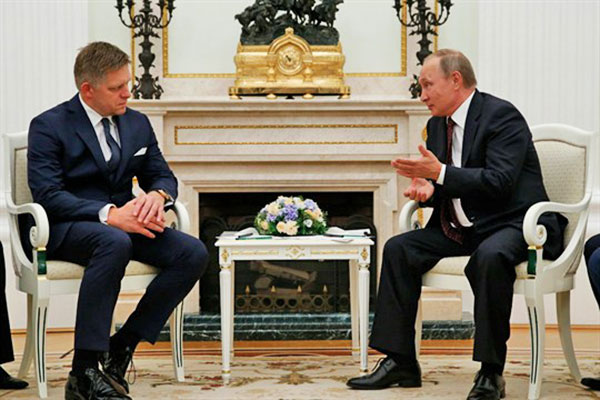|
and Robert Fico, Slovakia's prime minister at the time, during a meeting in the Kremlin Moscow, Russia, Aug. 25, 2016 (AP photo by Alexander Zemlianichenko).
Slovakia, a NATO member that has called itself part of the "core of the European Union," may talk positively about its Western orientation, but its actions recently suggest an increasingly closer alignment to Russia and its interests in Europe.
Many observers point to the junior partner in its coalition government, the Slovak National Party, or SNS, as the reason why.
The party's nationalist,
euro-skeptic leader, Andrej Danko, the speaker of the Slovak
parliament, has visited Moscow twice in the past eight months. Earlier this month, Slovakia's Defense Ministry, which is headed by a member of the SNS, postponed a long-awaited decision to replace Slovakia's fleet of aging Russian-made MiG-29s with Swedish Gripen fighter jets or U.S.-made F-16s.
The move was widely criticized, including by members of the ministry's own leadership as well as partners in the coalition government.
Defense Minister
Peter Gajdos had put the years-long talks with Gripen's
manufacturer, Saab, on hold and
invited other bids.
During a Slovak Cabinet meeting in late March in which the expulsions were discussed,
...Juraj Krupa, a former Defense Ministry official who now directs the security and defense program at the Slovak Security Policy Institute, told me, citing sources within the government.
Two officials, one
from the Foreign Ministry and the other from the European diplomatic
service, later confirmed that account. Both officials insisted on
anonymity to discuss internal government matters.
But as an official in Slovakia's Foreign Ministry put it to me, Danko,
Sympathy for Russia among SNS lawmakers has been out in the open for years, but only recently has it appeared to affect Slovakia's foreign policy.
The impact of the SNS has risen as the main governing party, the social-conservative SMER-SD, has weakened amid the political turmoil that followed the murder of an investigative reporter, Jan Kuciak, in February.
His killing sparked massive street protests and eventually led to the resignation of SMER-SD's longtime leader, Prime Minister Robert Fico, after 10 years in power.
The nature of Danko's sympathies toward Moscow is murky.
Despite rumors of clandestine Russian funding of the SNS, there is no hard evidence. But the party includes many former apparatchiks from the era of communist rule in Czechoslovakia.
Established on the
heels of the
Velvet Revolution in 1989 that
ended that regime, the SNS has sided with Russia on various issues
since the 1990s, from Russian skepticism over NATO enlargement to
the celebration of common Slavic roots.
The EU is "part of Eurasian space," he insists, and it would be an exaggeration to call Russia an aggressor.
Hrnko doesn't deny that Danko, the head of the SNS, helped block Slovakia from expelling Russian diplomats in March.
But he adds that
"he wasn't the only one" involved in that decision.
What this meant in practice was that the former prime minister talked positively about Russian President Vladimir Putin and was a critic of sanctioning Russia, but rarely acted on it. He largely followed the EU line toward Moscow, and some of his decisions even exposed Slovakia to Russia's anger.
In September 2014, for instance, at the peak of the crisis in neighboring Ukraine, Slovakia opened a reverse-flow oil pipeline to Ukraine, offering the easiest and cheapest way for Kiev to buy gas from the EU.
Public opinion in Slovakiais more favorable toward Russiathan anywhere else in Central Europe.But the country has many reasonsto be wary of Moscow.
According to Krupa, at the Slovak Security Policy Institute, Fico allowed the SNS to push and shove to save his party's coalition.
Support for SMER-SD, which Fico has led since 1999, has decreased drastically from a record high of 51 percent in March 2012 to just 20 percent in March, so snap elections were too risky.
As Krupa adds, the voters of both parties,
Indeed, if anything, the pro-Russian positions of Slovak politicians seem to strengthen their support at home.
Public opinion in
Slovakia is far more favorable toward Moscow than anywhere else in
Central Europe. This attitude is a mixture of sentiments over a
common Slavic background, the lack of historical problems with
Moscow - the one exception, of course, being the 1968 Soviet
invasion of what was then Czechoslovakia - and widespread distrust
among Slovaks toward NATO, despite the country's membership in the
alliance.
That is almost half
the number of Poles, at 67 percent, and Czechs, at 65 percent, and
still less than Hungarians, at 56 percent. According to the same
survey, Slovaks approve of Russian President Vladimir Putin's
policies more than their neighbors, with 41 percent agreeing with
them compared to just 13 percent in Poland.
The country is completely dependent on Russian oil and gas, both for its own consumption and as a transit country for Russian gas to the EU. That's why it is vehemently opposed to the proposed Nord Stream II, the major Russia-backed gas pipeline that would run under the Baltic Sea to Germany, bypassing Central and Eastern Europe.
Slovakia's economic relationship with Russia remains one-sided and narrowly focused on energy imports, though.
When it comes to trade, Russia isn't even among Slovakia's 10 largest export destinations.
Russia relies instead on soft-power initiatives to maintain its positive standing among Slovaks.
Pro-Putin propaganda campaigns, aiming to shift attitudes in Slovakia against the West, are evident online and among traditional media publishers. A year ago, Slovakia's largest news agency signed a controversial agreement with Russia's state-run Sputnik news agency.
It
was forced to cancel it days later
under pressure from liberal media, opposition groups and some more
Western-oriented members of SMER–SD.
The delayed deal to
replace Slovakia's MiGs may be another sign.
|


